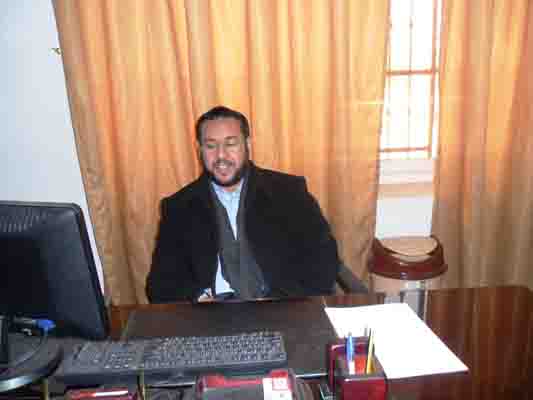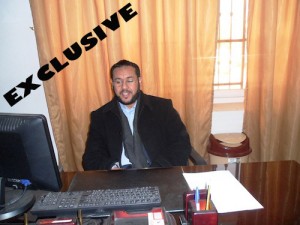Umar Khan interviewed the leader of Tripoli Military Council a few days ago. Belhaj is viewed abroad a controversial figure in . . .[restrict]the new Libya, but even within the country he excites strong opinions, either for or against.
The new Libya has an abundance of activists turned leaders. Most of them were working against Qaddafi and were forced into exile; now, however, they have returned and are much appreciated by the public for their efforts. Abdul Hakim Belhaj is one such leader who rose to prominence after the liberation of Tripoli on 20 August 2011.
He is currently the head of Tripoli Military Council which was created soon after the liberation of the city. He has been involved a number of controversies from the very beginning when he joined the anti-Qaddafi organization LIFG, Libyan Islamists Fighting Group. He participated in armed struggles against the Qaddafi regime for many years before fleeing Libya when the movement was crushed by Qaddafi.
He made his way to Afghanistan and stayed there in hiding for several years before being captured in 2004 and handed over to Libyan officials. (He is currently suing MI6 for their role in his rendition to Libya.) He was imprisoned in the infamous Abu Salim prison and was then sentenced to death after a short show trial but he, along with another 170 Islamists, escaped death when a deal was brokered by Sheikh Ali Salabi between the prisoners and Saif Al-Islam, Qaddafi’s most politically prominent son.
Belhaj voiced his support for the 17 February Revolution in the early days of the uprising and is widely seen as a central figure in the liberation of Tripoli. He has also been criticized heavily for his close ties to the state of Qatar, which is said to be supporting his organization with financial aid and military supplies.
When I spoke to him, he was coming out of a long meeting but he was kind enough to give me a few minutes for an interview.
I asked him about his religious views and he was very direct, saying that he followed “This great religion Islam which is naturally moderate and doesn’t force its beliefs onto others and which respects their opinions.”
He spoke about his struggle against Qaddafi and said that he joined the opposition in the 80s and was active in the late 80s. He described the formation of LIFG. “It was created by a group of patriotic young people who loved their homeland and were unwilling to watch Qaddafi destroy it. They tried their best to help Libyans get rid of Qaddafi and planned many attacks, especially in the early 90s, but unfortunately they never succeeded.”
I asked him about his cooperation with the other opposition groups such as the NFSL, the National Front for the Salvation of Libya, which was active at the same time as the LIFG. He stated that there was absolutely no coordination between the different opposition groups. “We were bound to each other socially but as far as working against Qaddafi was concerned, there was no cooperation at all.”
When asked why he and others left Libya during Qaddafi’s rule, he responded emotionally that they had been forced to leave the country. “Qaddafi imprisoned hundreds of youths and killed many in horrible conditions. Some were hanged and their hangings were broadcast on national television. We had no choice but to leave and we re-initiated LIFG and began our efforts to free Libya from Gaddafi.”
One of the major accusations made against him is that he made a deal with the former regime and thus accepted Qaddafi as a legitimate ruler. He defended his deal with the former regime that resulted in his release as well as that of hundreds of political prisoners. “We wanted them to have their freedom back and also to play an important role in the future of their country. It was important to reintegrate them into Libyan civil society.”
To my question regarding his release and the role of Sheikh. Ali Salabi he said that it was a vital achievement as the release of many prisoners took place and he emphasized the important role Sheikh Salabi played.
“He not only participated in the negotiations as a trusted figure but also helped exchange messages between prisoners and officials.” He also added that Salabi kept people informed and oversaw everything until the prisoners were actually released. “We are all thankful to him.”
I asked him if he had known about the planned 17th Feb 2011 protests in Benghazi and that the people would take to the streets to which he answered with a strong affirmative. “When I was in prison, we saw a small mutiny there and also the families of the Abu Salim prisoners were demanding their rights. We could see the government was weakening as some people refused financial settlements and we could see they were pushing for political reforms. After the success of the revolutions in Tunisia and Egypt, we were sure that Qaddafi would be next and by the grace of Allah, that happened and the great Libyan people were able to free themselves from tyranny.
“There is no special personal relationship with Qatar or with any other state,” he said, smiling at my question regarding his presumed close relationship with the Qatari government.
He further added that Qatar had provided logistical support as well as both humanitarian and military aid, but it was all sent to the National Transitional Council and to the Ministry of Defense.
“Throughout the revolution no military brigade was directly in touch with any other state. We not only thank Qatar but also Sudan, Jordan, the UAE and all brotherly nations which helped us in our struggle and revolution.” He also said that the Ministry of Defense was responsible for distributing the weapons received from different sources and there was absolutely no truth to the accusations that a few containers full of weapons meant for him, were taken by some Zintani brigades.
I asked him about the accusation that many people actually seem to believe that he was in the Nafusa mountains playing cards on the night of the “Operation: Mermaid Dawn” and he only made his way down to Tripoli once the whole city was liberated.
“Who gave me the cards?” he joked but then in a rather serious tone he added that the Tripoli was liberated from within by the revolutionaries of Tripoli who rose up against the Qaddafi forces. “We came as part of the forces that were coming from the mountains and we, along with the revolutionaries from Tripoli swept through the areas facing little resistance to the Martyrs Square and then on to the battle of Bab Al-Aziziya. There were no cards”.
My next question was about yet another controversy that he accumulated 1.5 million GBP bill in a luxury hotel when he rented dozens of rooms and refused to pay the bill. He responded with shock, saying that it was beyond comprehension that he was being targeted with all these baseless accusations. He also declared that he never rented any room in the hotel ever, a claim that was also confirmed by the official press release from the hotel’s management.
When asked about his military organization, he said: “I don’t have any brigade, I am just with the military council.”
I also asked him about how his organization is being funded and he was very quick to point out that the money is not the important issue for the revolutionaries and their foremost duty is to protect the installations of national interest and it’s the sense of responsibility that is important and not money. He added: “There are many well-wishers inside Libya who have been supporting them financially from the start of the revolution and they are still doing it. The transitional government is also handing out cash to the revolutionaries.”
I asked him that if he was getting involved in the Syrian conflict by helping the Free Syrian Army as the rumours suggest but he said that he has no intentions to involve himself into anything other than Libya.
“There is a lot to do in Libya and I’m not doing anything outside this map,” he said while drawing a map of Libya on his hand and ending this impromptu interview to attend to his other commitments.
With his account of the events leading to the liberation of Libya, one can’t help but wonder why he is constantly at the center of so much controversial news. Belhaj has now finally entered the political arena and announced that he is joining the National Party. The party is said to have the backing of Sheikh Ali Salabi and is seen as a strong competitor to Muslim Brotherhood’s Justice and Construction Party.
Umar Khan can be found at twitter.com/umarnkhan [/restrict]








